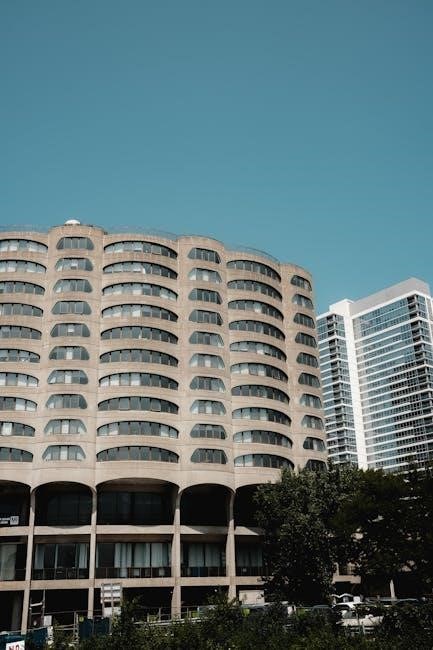The 2023 Chicago Residential Lease Agreement is an essential document ensuring compliance with local laws, providing a clear framework for rental terms, and protecting both landlords and tenants.
Overview of the 2023 Chicago Residential Lease
The 2023 Chicago Residential Lease is a legally binding agreement tailored to comply with local, county, and state laws. It provides a structured framework for rental terms, outlining responsibilities for both landlords and tenants. The lease is available in a fillable PDF format, ensuring ease of use and annual updates to reflect current legal requirements. Key components include rent details, security deposits, lease duration, and termination procedures. Designed to align with the Residential Landlord and Tenant Ordinance (RLTO), it ensures transparency and fairness in rental agreements. This document is essential for maintaining compliance and protecting the rights of all parties involved in a residential rental transaction in Chicago.
Importance of Using the Updated 2023 Lease Agreement

Using the updated 2023 Chicago Residential Lease Agreement is crucial for compliance with current laws and regulations, particularly the Residential Landlord and Tenant Ordinance (RLTO); This ensures that both landlords and tenants are protected under the latest legal framework. Annual updates incorporate changes in local, state, and federal laws, such as security deposit interest rates and eviction procedures. The lease provides clarity on terms and conditions, preventing misunderstandings and potential disputes. It outlines specific procedures for lease renewal and termination, ensuring legal compliance. The fillable PDF format simplifies customization, maintaining accuracy and consistency. Additionally, it includes updated late payment policies, helping enforce payment terms effectively. Staying updated is essential for a fair and legally sound rental agreement in Chicago.

Key Features of the 2023 Chicago Residential Lease
The 2023 Chicago Residential Lease includes updated compliance with local laws, a fillable PDF format, and clear guidelines for rent, security deposits, and lease termination.
Security Deposit Interest Rates for 2023
The 2023 Chicago Residential Lease specifies that landlords must pay tenants interest on security deposits at a rate of 0.01% for 2023. This rate is determined annually based on the Consumer Price Index and is significantly lower than previous years due to economic conditions. Landlords are required to provide this interest either annually or upon lease termination. Tenants must be informed of the interest rate in writing, ensuring transparency and compliance with local regulations. This provision protects tenants’ rights while clarifying landlords’ financial obligations, maintaining fair rental practices in Chicago. Staying informed about these rates is crucial for both parties to adhere to the Residential Landlord and Tenant Ordinance (RLTO).

Lease Renewal and Termination Procedures

The 2023 Chicago Residential Lease Agreement outlines specific procedures for lease renewal and termination. For renewals, landlords and tenants must mutually agree to extend the lease, with terms documented in writing. Landlords must provide a renewal notice at least 60 days before the lease expires, while tenants must respond within 30 days. For terminations, landlords can end the lease for non-compliance or breach of contract, requiring a 14-day notice for remediable issues or immediate termination for irreparable violations. Tenants also have rights to terminate under specific conditions, such as unsafe living conditions. Both parties must adhere to the Residential Landlord and Tenant Ordinance (RLTO) to ensure lawful and fair procedures.
Compliance with the Residential Landlord and Tenant Ordinance (RLTO)
The 2023 Chicago Residential Lease Agreement ensures full compliance with the Residential Landlord and Tenant Ordinance (RLTO). Landlords are required to disclose specific information, such as the name and address of the property owner and details about shared utility arrangements. The lease must include a written summary of the RLTO, attached to the agreement at the start of tenancy and renewal. It also outlines landlord responsibilities, including maintaining a habitable living environment and providing proper notice for inspections or repairs. Tenants are protected against unlawful evictions and retaliatory actions, ensuring a fair rental relationship. Compliance with RLTO safeguards both parties and ensures adherence to Chicago’s rental regulations.
Payment Terms and Responsibilities
The 2023 Chicago Residential Lease outlines rent due dates, accepted payment methods, and late fee policies, ensuring clarity and transparency in rental transactions.

Rent Due Dates and Accepted Payment Methods
The 2023 Chicago Residential Lease Agreement specifies that rent is due on the 1st of each month unless otherwise agreed upon in writing. Tenants are typically granted a grace period of five days to make payments without incurring late fees. Accepted payment methods include checks, money orders, or electronic payments through approved online portals. Cash payments are generally discouraged due to security concerns. Landlords are required to provide receipts for all payments upon request. This section ensures transparency and clarity, outlining the responsibilities of both parties regarding timely payments and acceptable forms of payment. It also helps prevent disputes by establishing clear expectations for rent collection. This structure promotes a smooth rental process and maintains a positive landlord-tenant relationship.

Late Fee Policies and Penalties
The 2023 Chicago Residential Lease Agreement outlines specific late fee policies and penalties to ensure timely rent payments. A grace period of five days is typically allowed, after which a late fee may be charged. The late fee is usually a percentage of the monthly rent or a fixed amount, as specified in the lease. Repeated late payments may result in additional penalties or legal action; Landlords must comply with the Residential Landlord and Tenant Ordinance (RLTO) when imposing fees, ensuring they are reasonable and non-punitive. Tenants are encouraged to review the lease for exact terms to avoid disputes. This section promotes accountability and fairness in rental obligations, protecting both parties’ interests while maintaining compliance with local regulations.

Completing the 2023 Chicago Residential Lease
The 2023 Chicago Residential Lease is available in a fillable PDF format, simplifying the process for landlords and tenants. It must be completed accurately, ensuring all required fields are filled to maintain legal validity and compliance with local regulations. Annual updates ensure the document reflects current laws, making it essential to use the correct version for each year. Proper completion helps prevent disputes and ensures a smooth rental agreement process.
How to Fill Out the Fillable PDF Format
The 2023 Chicago Residential Lease Agreement is provided in a fillable PDF format, designed to simplify the completion process. Users can easily type information directly into the fields, ensuring accuracy and clarity. The document must be completed in its entirety, with all required fields filled out to maintain legal validity. Landlords and tenants should carefully review each section, ensuring all terms, such as rent amounts, lease duration, and security deposit details, are accurately entered. The fillable PDF format allows for easy editing and saving, making it convenient to reuse for multiple tenants or properties. Annual updates ensure compliance with the latest local, county, and state laws, so it’s important to use the correct version for each calendar year. Proper completion helps prevent disputes and ensures a smooth rental agreement process.

Annual Updates and Compliance Requirements
The 2023 Chicago Residential Lease Agreement is updated annually to reflect changes in local, county, and state laws, ensuring compliance with the latest legal requirements. It is crucial to use the current version for each calendar year, as outdated leases may not adhere to updated regulations. The fillable PDF format allows for easy annual updates, maintaining accuracy and legality. Landlords must ensure they use the most recent version to avoid potential disputes or penalties. Annual updates also incorporate new protections for tenants and clarify responsibilities for both parties. Staying compliant is essential to uphold the rights and obligations outlined in the Residential Landlord and Tenant Ordinance (RLTO). Always verify the document’s version before use.
Landlord and Tenant Rights and Responsibilities
The 2023 Chicago Residential Lease Agreement outlines clear rights and duties for both landlords and tenants, ensuring compliance with the RLTO and fostering a fair rental relationship.
Key Rights of Tenants Under the RLTO
Tenants in Chicago are protected under the Residential Landlord and Tenant Ordinance (RLTO), which ensures fair treatment and clear rights. These include the right to a habitable living environment, protection against unlawful evictions, and advance notice for rent increases or lease termination. Tenants also have the right to receive interest on their security deposits, with rates specified annually, and are protected from retaliatory actions by landlords. The RLTO mandates timely repairs and maintains tenants’ privacy by requiring proper notice for property inspections. Understanding these rights helps tenants navigate disputes and ensures landlords comply with legal obligations, fostering a balanced rental relationship.
Landlord Obligations in the 2023 Lease Agreement
Landlords in Chicago are required to fulfill specific obligations under the 2023 Residential Lease Agreement and the RLTO. These include maintaining the property in a habitable condition, complying with all applicable building codes, and ensuring proper functioning of essential systems like heat, water, and electricity. Landlords must also disclose specific information, such as their contact details and any known hazards. They are obligated to return security deposits with interest within 45 days of lease termination and provide written notice for rent increases or lease termination. Additionally, landlords must adhere to legal eviction procedures and avoid retaliatory actions against tenants. These obligations ensure accountability and fair practices in rental agreements.
The Chicago Residential Landlord and Tenant Ordinance (RLTO) outlines rights and responsibilities for both parties. Download the 2023 lease PDF from the Chicago Association of Realtors or the city’s website for compliance guidance and updated rental agreements.
The Chicago Residential Landlord and Tenant Ordinance (RLTO) protects both landlords and tenants by outlining clear rights and responsibilities. It covers key areas such as security deposit regulations, lease termination procedures, and eviction guidelines. The ordinance requires landlords to maintain habitable living conditions and provide essential services like heat and water. Tenants are entitled to written leases and must be notified of any lease changes or terminations. The RLTO also mandates that a summary of the ordinance be attached to every rental agreement. Compliance with the RLTO is crucial for both parties to avoid legal disputes. The updated 2023 Chicago Residential Lease Agreement reflects these requirements, ensuring fairness and transparency in rental transactions. Landlords and tenants can download the official 2023 lease PDF from the Chicago Association of Realtors or the City of Chicago’s website for accurate and compliant agreements.
Where to Download the 2023 Chicago Residential Lease PDF
The 2023 Chicago Residential Lease Agreement PDF can be downloaded from the official website of the Chicago Association of Realtors or the City of Chicago’s official website. These platforms provide the most up-to-date and compliant versions of the lease agreement. Additionally, it is available on legal document websites such as Document Center and other trusted sources. The PDF is fillable, making it convenient for landlords and tenants to customize the agreement according to their needs. Ensure you download the correct 2023 version, as it includes all updates to local, county, and state laws. Annual updates are essential for compliance, so avoid using outdated templates. Always verify the source to ensure authenticity and accuracy.
